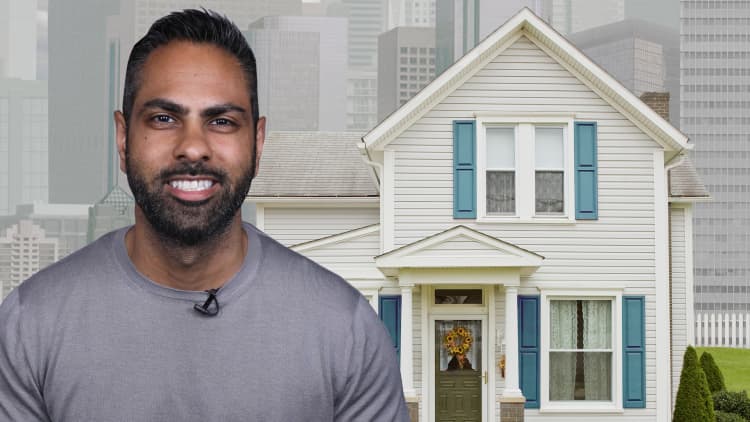Many college students living on a tight budget take on side-jobs just to scrape together and save enough money to help them pay off student loan debts down the road.
But self-made millionaire Eric Wu spent his college scholarship money and free time building an impressive real estate portfolio that included roughly 25 properties by the time he graduated in 2005, he tells CNBC Make It. And that paved the way for him to make millions in the real estate and tech industries.
Today Wu is the 36-year-old co-founder CEO of $3.8 billion real estate start-up Opendoor, which allows users to buy and sell their homes online. But nearly two decades ago, Wu was still a college student studying economics at the University of Arizona.
The real estate shopping spree started when Wu was just 19 years old, when he says he had "this notion that I didn't want to pay rent, so I ended up finding a way to buy a home," he tells CNBC Make It.
In fact, Wu discovered that he'd collected enough scholarship money to provide him with the capital to cover the roughly $20,000 down-payment on a modest three-bedroom home near his school's campus in Tucson, Arizona.
"I used my scholarship funds to use as a down-payment, and then I lived in the home and rented out some of the rooms. And then I used that [monthly rent income] to pay for my living costs and other things associated with being at school," Wu says of the property.
Wu describes the 1,600-square-foot home, which he says cost about $110,000 overall, as a single-family home where the garage and one of the bedrooms had been converted into studio apartments. Wu rented out the two studios and took the rest of the home for himself.
The idea to buy a home at a young age came from Wu's mother, a social worker who raised Wu and his two sisters as a single mother (their father passed away when Wu was 4) in Glendale, Arizona, and who Wu describes as "the most frugal woman in the world."

"She was a single mom and really hated wasting money, and [she] believed that renting was really a waste of money, so she bought her first home when I was 2," Wu tells CNBC Make It. "That principle ended up sticking with me."
While Wu was following his mother's advice by purchasing his first home, he says he found that he "ended up really loving the experience and the transaction" — so, he didn't stop there.
"What happened was I refinanced the home and pulled out equity and used that as a down-payment [on] other homes I ended up buying during that time," Wu says.
In other words, not long after buying his first property, Wu refinanced his mortgage on that home to get enough capital to put a down-payment on a second home — and, on and on, until he owned more than two dozen properties in Arizona within just a few years. Like he did with the first property, Wu rented out the homes he bought subsequently and used that income to cover his living expenses as well as the mortgage payments for all of his properties.
"It's something I just did in my free time. I had a strong interest in doing this nights and weekends," he tells CNBC Make It.
In fact, buying real estate was Wu's primary hobby throughout college, he says, along with learning to write computer code and build websites. "So, instead of doing all of the things that, maybe, typical college students would do on the weekend, I would spend time both building websites and shopping for real estate," Wu says.
Both of those hobbies ended up proving quite valuable for Wu, who went on to combine his passions for coding and real estate soon after graduating from college, when he started working on his first real estate tech start-up. In 2008, Wu co-founded RentAdvisor.com, a platform for people to post reviews of neighborhoods and landlords for renters deciding where to live.
RentAdvisor later sold to Apartment List for an undisclosed amount in 2013, but by then Wu had already moved on to another project called Movity. That start-up — which analyzed neighborhood data, like crime statistics, commute times and real estate prices, to help home-buyers decide where to live — launched out of the tech incubator Y Combinator in 2009 and raised $1.3 million in funding before selling a year later to real estate website Trulia. (Wu served as Trulia's head of geo-data and social products until 2013.)
In 2014, Wu co-founded Opendoor. The company will buy a user's home and then resell it to another user via an app or online. Home values are determined by algorithms. The company now employs over 1,300 people and it's raised a total of $1.3 billion in outside funding — valuing the company at $3.8 billion — from investors who include Softbank's Vision Fund, VC firm Andreessen Horowitz and former Uber CEO Travis Kalanick's 10100 Fund.
Don't Miss:
The 10 best cities to buy your first home
Like this story? Subscribe to CNBC Make It on YouTube!


